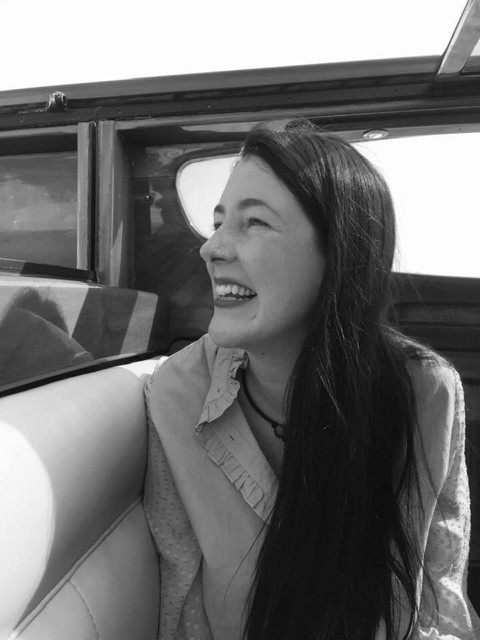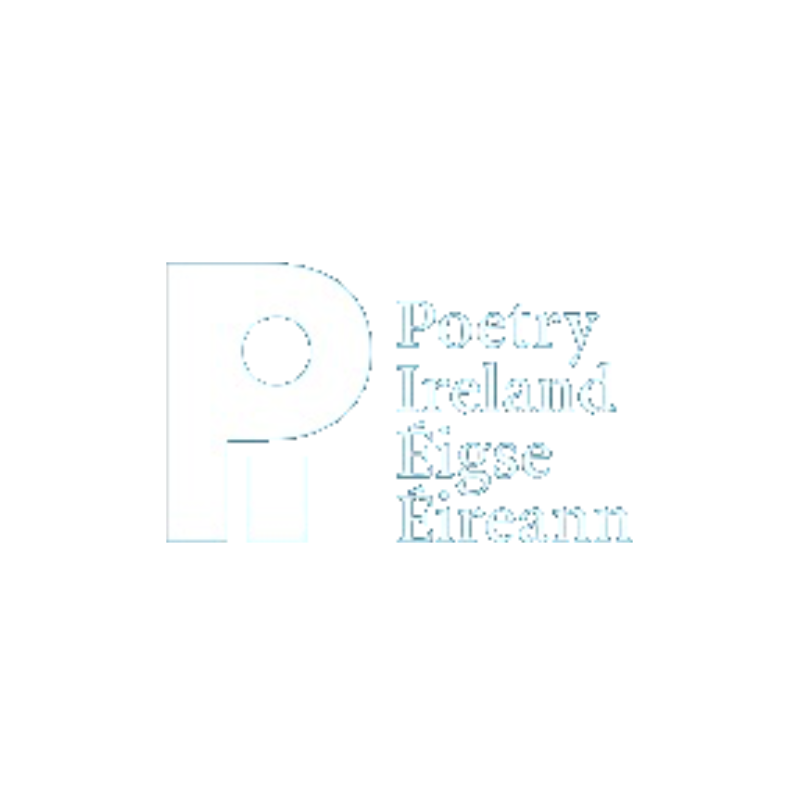
Thursday, Oct 2 – Sunday, Oct 5
NEWCASTLE WEST CO. LIMERICK
READINGS | MUSIC | POETRY | FILM | LAUNCHES | TALKS | COMEDY | EXHIBITION | STORYTELLING | POETRY TRAIL
Éigse Michael Hartnett 2025
Welcome to Hartnett Country and to this year’s Eigse Michael Hartnett Literary and Arts Festival. It is our hope that you will join us for some or all the events which we have lined up in this year’s festival programme which will run from Thursday, October 2nd to Sunday, October 5th in Newcastle West.
Éigse Michael Hartnett began life in 2000, following the death, in October 1999, of the poet Michael Hartnett, a native son of Newcastle West. It was our way of honouring Michael’s legacy as one of Irish poetry’s most original, lyrical and independent voices.
Every year since, Éigse has sought to continue and enrich that legacy by bringing together poets and musicians, writers, thinkers and artists in his home-town. This year, once again, we offer a wide-ranging programme that includes a lively opening parade along with poetry, music, readings, humour, history, talks, film, a bus tour, a poetry trail, and workshops.
Ours is a warm, intimate and friendly festival that holds out the hand of welcome to all. Do come and join us.
Éigse Michael Hartnett is made possible through the backing and funding of the Arts Council and of the Limerick City and County Council Arts Office. We are grateful for their continuing support.
This year’s organisers are Mary Carroll, Deirdre Cussen, Vincent Hanley, Rachel Lenihan, Rose Liston, Vicki Nash and Norma Prendiville.
We strongly recommend that people book in advance on our website so as not to be disappointed. Tickets will also be sold at door, provided numbers have not been exceeded.
As part of our preparations for Éigse 2025 we decided to ask Paula Meehan to be our special guest on Opening Night, 2nd of October.
Her remit was to ‘speak from the heart about her memories of Michael Hartnett’. She did so by framing her thoughts in the form of A Letter to Michael Hartnett. This was written on the 1st of October 2025, the night before the Éigse in his name opens in his native Newcastle West, County Limerick. The result is truly magnificent and deserves to be shared with Michael’s family, and his many friends and ardent followers who didn’t make it to the Library in Newcastle West on the night.
Dearest Michael,
Tomorrow I will rise with the sun and take to the road and by eight-ish I will stand to speak of you before a crowd of your devotees in your home town where your name will be on everyone’s lips. Being blessed for the most part — but you have to allow, as you’d say yourself: there’s always the one.
The Éigse founded in your name will be opened with ceremonials and celebrations through all the arts, on its twenty fifth birthday. If fate allows, I’ll be there to sing your praises, to sing them to the high heavens, where I hope you reside with the cherubim and seraphim, your ears ringing with their choral magic. I’ll say you were and are of greatness wrought. I’ll offer gratitude for the poems you carried, for the pure music of your shining spirit. So many of us will be gathered in your name and cherishing all you stand for.
I’ll be aware, too, of your black sardonic eye on proceedings somewhere in the otherwhere of elsewhere; aware especially of how you hated poets going on, and on. And weren’t afraid to let them know. Now as I enter my anecdotage and my crankitude, I can hear your voice in my ear:
‘Just tell them I’m not the worst.’
That’s what you whispered one night as I rose to introduce you to students in a small back room, over fifty years ago. After the reading they would have died for you, each and every one of them, so thoroughly had you enchanted them. I remember the joke you told them at the end of your reading: ‘What do you get if you cross a donkey with a bag of onions? A ride that would bring tears to your eyes’.
‘Come to the Éigse,’ said Norma Prendiville, ‘and speak from the heart about Michael for twenty minutes.’ Michael, I’ll speak from the heart you broke. You broke the hearts of all of us who loved you.
You were our purest poet. Our own Orpheus.
Even Eavan Boland, who reckoned there was no Orpheus in Ireland, came to understand the Orphic nature of your lyric. I extract from ‘Irish Poetry’, the poem she dedicated to you, where she tells how over a pot of tea one winter’s evening you — began to speak of our own gods.
Our heartbroken pantheon:
No Attic light for them and no Herodotus.
But thin rain and dogfish and the stopgap
of the sharp cliffs
they spent their winters on.
And the pitch-black Atlantic night.
And how the sound
of a bird’s wing in a lost language sounded.
You made the noise for me.
Made it again.
Until I could see the flight of it: suddenly
the silvery, lithe rivers of your south-west
lay down in silence.
And the savage acres no one could predict
were all at ease, soothed and quiet and
listening to you, as I was.
As if to music, as if to peace.
Eavan, who always referred to you as Mikey, with great fondness.
I first met you, Michael, in Grogan’s Castle Lounge in South William Street in my native city of Dublin. The poet’s horror hole a friend called it, a poet already sober, a rare enough thing in Grogan’s Castle Lounge. In those days fadó, fadó.
It is nineteen eighty-three and I am just back home to Dublin. I have been studying for a Masters of Fine Arts degree, in Washington State in the far Northwest of the United States. I brought two slim volumes with me when I left for the States – poets I had never met in person, but I considered them poetical mother and father to my craft or sullen art.
The books were Eavan Boland’s 1980 volume In Her Own Image and your 1975 volume A Farewell to English. When I met you that first time in Grogans, introduced by Tommy Smith, I told you I had the whole of the title poem, dedicated to Brendan Kennelly, by heart. Go on so, said you, prove it. I did. By heart. With only a few wobbles.
I think you were gobsmacked. You asked to see poems for, you said, I must be a poet. I showed you one I had in my pocket — do young poets
still carry new poems on their person? Maybe on their mobile phones ….. I showed you one and you said it wasn’t very good. I showed you another and you said that was much better. The real thing. Of course, I paid no heed to your critique. Isn’t arrogance a protective force when you’re a baby poet?
If I had the whole poem by heart then, I have only fragments now, but it comes back to me when I need it. It gets me through as much as it gets through to me, the beautiful, sustained meditation on our politics. our culture, our colonised minds. Your masterpiece of scorn and hurt and resistance.
In the choppy waves of loneliness in an American university the poems kept me on some kind of even keel. They were part of the reason I came back to Ireland despite the terrible prospects.
‘What are you going home for? Sure all the kids are going the other way?’ ’What are you coming home for. There’s no work here.’
The era of last one to leave the country turn out the lights. The era of redundancies, butter vouchers, dole queues, heroin hitting the poor communities of the inner city like a juggernaut, moving statues, The Kerry Babies, Anne Lovett, The Heavy Gang. The Troubles live on TV every night.
You understood I came home to get the poems I needed to get.
What did we talk of on those walks by the Camac River, that palindromic waterway? Oh, you could fascinate from Akhmatova to Zozimus. You were dazzling in your erudition. You had the names, and the naming and so took possession of every blooming thing, of every wingèd thing and creature of the riparian zone. In two tongues.
I found blessing and curse in every poem. You were countryman. You were cosmopolite. You were ancient. You were avant garde. You were
honey. You were vitriol.
Kind. Ferocious. Wicked. Lonely. So lonely, Michael, for your boy and your girl, for Niall and Lara, your beautiful children.
I carried your poem ‘Death of an Irishwoman’ like a holy fire. You understood that the most important culture bearers come in humble guise, like the Zen master scrubbing the kitchen floor of the monastery. Your ‘ignorant’ grandmother Bridget Halpin who gave you Irish, who handed you the tool you would use to decolonise your mind. Decolonise our minds.
You were the wounded healer.
Death of an Irishwoman
Ignorant, in the sense
she ate monotonous food
and thought the world was flat,
and pagan, in the sense
she knew the things that moved
at night were neither dogs nor cats
but púcas and darkfaced men,
she nevertheless had fierce pride.
But sentenced in the end
to eat thin diminishing porridge
in a stone-cold kitchen
she clenched her brittle hands
around a world
she could not understand.
I loved her from the day she died.
She was a summer dance at the crossroads.
She was a card game where a nose was broken.
She was a song that nobody sings.
She was a house ransacked by soldiers.
She was a language seldom spoken.
She was a child’s purse, full of useless things.
I carried that poem into workshops, workshops in universities, in prisons (sometimes on the same day). I read it with women prisoners, with the political prisoners in Portlaoise, with the men in Arbour Hill High Security Prison, in recovery programmes. I brought it into art colleges, into classrooms all over the country, into other countries.
Everyone has loved someone from the day they died. Some creature. Some thing.
Only last week at a workshop in Kilmore Quay I read that poem and there was a gasp, an audible intake of breath on the line, ‘I loved her from the day she died.’ She will never die, your grandmother, bearer of Irish, cultural heroine, your grandmother Bridget Halpin.
Those last few years of your life, your ever faithful friend Tony Curtis would drive myself and Theo (Dorgan) out to Dundrum where you lived close by what you called The Sentimental Hospital, known to the rest of us as The Central Mental Hospital. You were dying in the loving care of Angela Liston.
The October of your going was radiant and glorious. But the day of your funeral it lashed. Early to the town for the burial, we took shelter in a pub. A man came in and said there’s a fierce crowd in for a funeral. Dinny Hartnett, the postman — his brother the poet is after dying. You would have liked that, Michael. You would like that the woman in the Pound Shop gave us armfuls of umbrellas, all the umbrellas in the shop, and wouldn’t take any money. Sure bring them back when the funeral’s over.
I did a poetry reading in Limerick a while back, in the City Gallery under Eddie Maguire’s magnificent portrait of you, the one on the front of your Collected Poems. Una McCarthy, who has recently retired as Director of the Gallery, had fought a long hard battle to wrest the funding for it and get it back to Limerick from a private collection in the United States. You hung there, your black eyes boring into me, as intensely as they had in life. You could read minds, an uncanny gift. You were drawn to the wounded in bar or street. I saw people open to you like flowers – they felt your nobility of spirit, your deeply empathetic heart.
Michael, I hope wherever you are that this Éigse energy in the streets of the town of your birth will touch you. Your name is on every tongue. You are cast in bronze in the marketplace. The rain flows down your beautiful face, mingles with the tears you shed for your mother, for your father in his blanket of snow.
I send this letter into the void, dear Michael, in gratitude, devotion and fond memory.
Sincerely,
P. Meehan
Irish-language poet and editor Aifric Mac Aodha has been named the winner of the 2025 Michael Hartnett Poetry Award for her third collection, Old Friends (The Gallery Press, 2024)
Described by judges as “affecting” and “at times dark,” the collection marks a “significant achievement” in Mac Aodha’s poetic career. The poems are written in Irish, with English translations by fellow poet David Wheatley.
Judges Ailbhe Ní Ghearbhaigh and Louis de Paor praised the collection, stating:
“There is an unmistakable linguistic assurance in these poems alongside an agility in poetic form, in which the narratives are often half-obscured beneath the surface of the poem, amplifying the mysteriousness and emotional sensitivity of the work. There is a sense that she is consistently expanding the resources of the language as she continues to sharpen her own poetic idiom. She has a particular gift for finding cadence between words in surprising ways.”
The award, worth €8,000, will be presented on the opening night of Éigse Michael Hartnett 2025, taking place on Thursday, 2 October in Newcastle West, Co. Limerick. The award is supported by Limerick City and County Council and Arts Council partnership framework agreement.
Responding to the announcement, Aifric Mac Aodha said:
“It is a great pleasure and an even greater surprise to receive the Michael Hartnett Poetry Award. In his ‘Poem for Niall, 7’ – a poem full of love and humanity – Hartnett tells us that ‘ink speaks and paper speaks’. Poets can only say what they have to say through their poems, and poetry can be difficult to achieve. For those reasons, it means a great deal to me that the judges have chosen my collection, Old Friends. I am grateful to them, to the festival organisers, and to my translator, David Wheatley.”

Aifric Mac Aodha is the Irish-language editor of Poetry Ireland Review. Her debut collection, Gabháil Syrinx (The Taking of Syrinx), was published by An Sagart in 2010. Her work has appeared in numerous journals, including POETRY for Young Irish Poets, and has been translated into French, German, Italian, Spanish, and Czech.
She has taught in St Petersburg, New York, and Canada, and has lectured in Old and Modern Irish at University College Dublin (UCD). She has received multiple bursaries from The Arts Council. Her latest collection, Old Friends, with translations by David Wheatley, was published by The Gallery Press in 2024. She lives in Dublin, where she works for the Irish-language publisher An Gúm.
David Wheatley, born in Dublin, has published four collections with The Gallery Press and two with Carcanet Press.
Buann Aifric Mac Aodha Duais Filíochta Michael Hartnett, 2025 do Chnuasach Dátheangach Old Friends.
Ainmníodh file Gaeilge agus an t-eagarthóir Aifric Mac Aodha ina buaiteoir ar Dhuais Filíochta Michael Hartnett 2025 i ngeall ar a tríú cnuasach, Old Friends (The Gallery Press, 2024).
“Corraitheach” and “dorcha ar uairibh” an cur síos atá déanta ag na moltóirí ar an gcnuasach agus is “gaisce suntasach” é an cnuasach i ngairm filíochta Mhic Aodha. Is i nGaeilge atá na dánta, agus leaganacha Béarla curtha orthu ag an bhfile David Wheatley.
Mhol moltóirí Ailbhe Ní Ghearbhaigh agus Louis de Paor an cnuasach go haer, agus bhí le rá acu:
“Tá ardmhuinín teanga agus aclaíocht foirme filíochta le sonrú go follasach sna dánta seo agus scéalta leathbháite faoi dhromchla an dáin aici a chuireann le mistéir agus le béim mhothálach na filíochta. Braitear go bhfuil leathadh leanúnach á dhéanamh aici ar acmhainn na teanga fad is atá faobhar á chur aici ar a friotal filíochta. Tá bua ar leith aici cling agus uaim agus rím a bhaint as focail ar bhealach nach mbeifí ag súil leis.“
Bronnfar an duais, ar fiú €8,000 í, ag oíche oscailte Éigse Michael Hartnett, 2025, a bheidh ar siúl Déardaoin, an 2 Deireadh Fómhair i gCaisleán Nua Thiar, Contae Luimnigh. Tacaíonn Comhairle Cathrach agus Contae Luimnigh agus comhaontú creata comhpháirtíochta na Comhairle Ealaíne leis an duais.
Dúirt Aifric Mac Aodha, mar fhreagra ar an bhfógra:
“Díol áthais dom an gradam seo. Sa phíosa álainn, ‘Dán do Niall, 7’, dearbhaíonn Ó hAirtnéide go ‘labhraíonn dúch’ is go ‘labhraíonn pár’. Ina chuid dánta a nochtann file ar bith a phriocadh anama féin. Ní furasta dán a chur i gcrích ach ábhar sásaimh/iontais i gcónaí d’fhile nuair a thugann léitheoir taitneamh dá shaothar. Ar an ábhar sin, is rímhór agam é gur roghnaigh na moltóirí Old Friends (The Gallery Press, 2024). Tá mé an-bhuíoch díobhsan, de Peter Fallon, agus de David Wheatley, aistritheoir an leabhair.”
Tá Aifric Mac Aodha ag obair ina heagarthóir Gaeilge le Poetry Ireland Review. D’fhoilsigh An Sagart an chéad chnuasach filíochta léi, Gabháil Syrinx, sa bhliain 2010. Cuireadh dánta dá cuid i gcló ar irisí éagsúla, POETRY Young Irish Poets ina measc. Aistríodh a saothar go teangacha éagsúla, an Fhraincis, an Ghearmáinis, an Iodáilis, an Spáinnis agus an tSeicis san áireamh.
Bhronn An Chomhairle Ealaíon mórchuid sparánachtaí uirthi. Is é Old Friends (The Gallery Press, 2024) an cnuasach is déanaí léi. Tá cónaí uirthi i mBaile Átha Cliath, áit a bhfuil sí ag obair ina heagarthóir cúnta leis an nGúm.
Contact
To contact Éigse send us a message using the contact form below or call us on 087 038 9902.
For details on accomadation options in Newcastle West and further information visit: http://www.newcastlewest.ie





